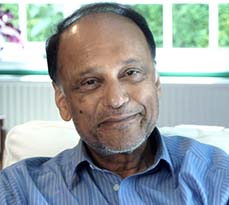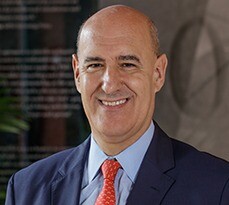
Society is currently going through a “bottleneck” in addressing climate change that nature-based solutions and new international institutions could help solve over coming years, two sustainability experts said in the latest of a Cambridge Judge Business School webinar series.
The webinar – entitled “Nature, climate and biodiversity – why should they matter to business” – heard from Professor Sir Partha Dasgupta of the Faculty of Economics at the University of Cambridge, and Dr Jaime Cavelier, Vice President of Strategic Partnerships for the International Conservation Caucus Foundation (ICCF), in the lead-in to the COP26 climate change conference in Glasgow.
The event was moderated by Jennifer Howard-Grenville, Diageo Professor in Organisation Studies at Cambridge Judge, with an introduction and closing remarks from Professor Mauro Guillén, the new Dean of the Business School. The webinar was part of a series – CJBS Perspectives: Leadership in Unprecedented Times – organised by the Alumni & External Engagement department at Cambridge Judge.

“We’re actually going through a bottleneck, but I’m pretty optimistic that once we get through this bottleneck, we will actually have the political will to actually provide the funding necessary to maintain the system that will allow us to buffer the impact we are now seeing in climate change”, said Dr Cavelier.
“I think Glasgow is actually going to centre some of the agenda on nature-based solutions, because it’s not just about engineer-based solutions.”
Professor Dasgupta agreed “we are in a bottleneck, and I think it’s tighter than we imagined.” He called for new international institutions that link up global and national policies – for example, charging rent for use of the ocean, and using some of the money raised to compensate countries to protect their rainforests.
“This needs some complementary institutions, and once it’s put together I think it can work,” said Professor Dasgupta, who earlier this year headed a major report for the UK government entitled The Economics of Biodiversity: The Dasgupta Review.

Drawing those two observations together, moderator Professor Jennifer Howard-Grenville said: “We value nature but for the most part its value is invisible in our economic system, in our businesses and indeed in our political system, so we need them all to transform the way we look at these issues”.
Professor Dasgupta said that the biosphere should be thought of as a “huge, gigantic capital asset” composed of smaller capital assets we call “ecosystems”, so the gap between supply and demand for those component assets is causing a deterioration of the biosphere.
“Services that Mother Nature offers us and which we use are complementary to one another,” he said. “If you press hard on one of them the others will be compromised too. Nature is robust enough, not a house of cards, but we are so powerful as a species we can convert nature into a a house of cards and basically threaten the incredible tapestry that has evolved over 4.3 billion years”.

Dr Cavelier said the ICCF “occupies a unique niche” to bring parliamentarians of all political persuasions together to tackle conservation issues. “The whole idea is to create political will: it is about governance, it’s about working with those who have the power and the mandate to determine in many places the initial budgets that would go to the conservation efforts.”
In his concluding remarks, Dean Mauro Guillén said: “If we take seriously the idea that the ecological environment is an asset for all of us, then we really need to price that asset, we need to put a price on how we use that asset, and we need to have an incentive – that’s what the economic perspective tells us, and companies need to make decisions based on that incentive structure that is created”.
“That’s what I frequently hear from business leaders. They say: ‘Give me a price and I’ll pay the price, I need to operate my firm’.”


